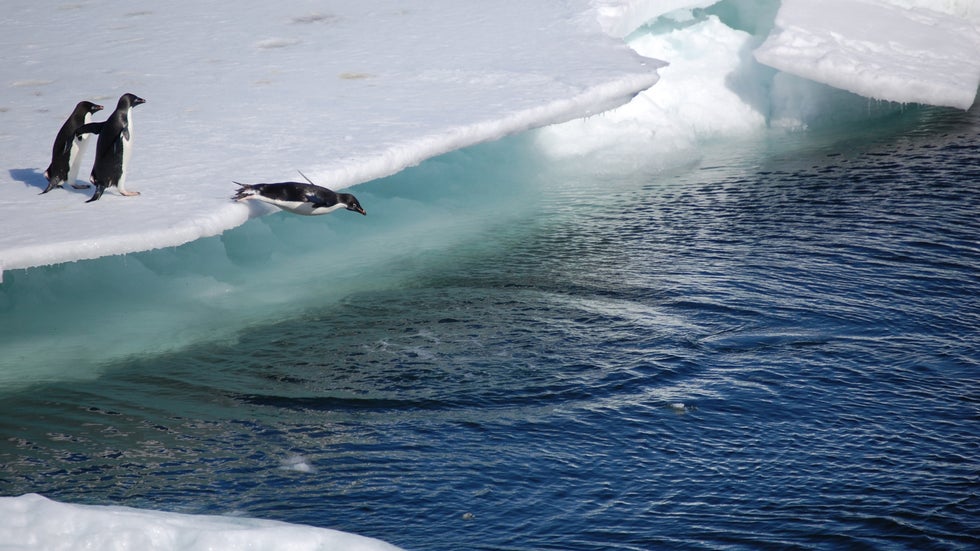Jan Wesner Childs
Scientists in Antarctica have spotted troubling signs of a marine heat wave.
Carlos Moffat, an oceanography professor at the University of Delaware and part of the Palmer Long-Term Ecological Research Program, recently observed unusually warm water temperatures and reduced sea ice off the West Antarctic Peninsula.
At the same time, the Antarctic sea ice extent is at a record low, according to the National Snow and Ice Data Center.
Moffat talked to us via email about what this could mean and why it matters.
Here’s what he said.
Ocean temperatures were found more than 2 degrees Fahrenheit above normal.
“This is quite significant for waters in Antarctica, where temperatures tend to have a narrow range of a handful of degrees ... We think of marine heat waves as persistent (days to months) warm anomalies. It’s a little early to know, but it does look like this will be a significant event.”
(MORE: New Website Tracks Climate Change Effects In Real-Time)
Melting in Antarctica has a direct impact on sea level rise.
“We know a warming ocean around Antarctica promotes higher melt rates of marine-terminating glaciers and ice sheets. The impact will depend on how deep the warming reaches, which we still have to determine. Of course, increased melting of Antarctic ice has a direct impact on rising sea levels around the world. While a very remote region, Antarctica plays a critical role in a tightly connected global climate system.”
(MORE: Two Major Antarctic Glaciers May Be Melting Faster Than Any Time in Past 5,000 Years)
 Adelie penguins dive off the ice and into the sea at Ross Island, Antarctica.
Adelie penguins dive off the ice and into the sea at Ross Island, Antarctica.A marine heat wave would impact critical ecosystems.
“Many marine organisms around Antarctica, from Adélie penguins to Antarctic krill to minke whales, depend on sea ice at some point during their life cycles. These warm, low sea ice conditions are most likely to negatively impact the distribution or survival of those species.”
(MORE: Penguin Population Sees Sharp Decline In Parts Of East Antarctica)
Water temperatures in the region have trended warmer for years, but not like this.
“We have observed changes around Antarctica (where) conditions have evolved in concerning ways over the span of decades. But the very warm, low sea ice conditions we are observing now seem extreme even in the context of that long-term change.”
(MORE: Previously Unknown Viruses Discovered in Melting Glacier)
Long-term observations are key.
“I want to emphasize that recognizing this kind of unusual, dramatic event requires observing the ocean around Antarctica for long periods of time. We can only do that with sustained efforts in these remote regions. We will be able to tell how extraordinary (this) event is only because we have 30 years of data to compare to this year’s conditions.”
(MORE: Climate Change Is Moving Young Great White Sharks Farther North In California)
It remains to be seen if the current temperature anomalies are related to overall warming.
“It is too early to tell how closely linked this event is to climate change - we need to analyze the data and submit our interpretations for peer review. But these kind of marine heat waves have become more prevalent elsewhere in the world, and studies have shown that they are expected to become more so under a warmer climate.”
The Weather Company’s primary journalistic mission is to report on breaking weather news, the environment and the importance of science to our lives. This story does not necessarily represent the position of our parent company, IBM.
The Weather Company’s primary journalistic mission is to report on breaking weather news, the environment and the importance of science to our lives. This story does not necessarily represent the position of our parent company, IBM.

No comments:
Post a Comment